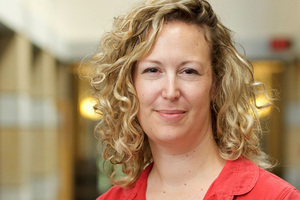
Ruth Carmi is a Ph.D. student in Peace Studies and Sociology. Ruth's research examines the effect of the Israeli-Palestinian conflict on the systematic marginalization of Palestinian women and Jewish women of color. Prior to joining the Kroc Institute, Ruth worked as a human rights lawyer focusing on issues of incitement to racism and violence against Palestinians as well as resource allocation to the Palestinian community in Israel. . In this student Q&A, she dives deep into her research and shares her recommendations on how peace education can be improved.
Why are you interested in Israel/Palestine? What do you want to discover through your research?
The immediate answer is that I study Israel and Palestine because it is my home, and so I am emotionally invested in working towards social change in that area and towards a sustainable justpeace. I was born at a time when the Israeli-Palestinian conflict and the Israeli occupation of the Palestinian people were almost a given. I grew up in the center of Israel in a middle-class secular small town where most people failed to see how the conflict and the occupation affect their daily lives. My work exposes these connections by examining the effect of the Israeli-Palestinian conflict on the social structure of Israeli society, including its inner Jewish racial formation. My dissertation work titled “Intersectionality and the Israeli Welfare State” does so by qualitatively analyzing Israeli Supreme Court cases that focus on Israeli mothers of color and their struggles with the Israeli welfare state. The cases represent the three most marginalized ethno-racial groups in Israeli society: Ethiopian Jews, Mizrahi Jews (Jews with ancestral roots in Arab and/or Islamic countries), and Palestinians. My findings show that the Israeli-Palestinian conflict centers Israeli social understandings around the binary of “Jews versus Arabs,” denying the systematic racism towards Jews of color and particularly mothers of color. This binary discourse is so ingrained in Israel’s social structures that it permeates even the state’s welfare functions meant to promote equality and distributive justice. This binary discourse also obscures how the Israeli welfare state constructs mothers of color as “bad mothers,” ensuring their ongoing dependency on welfare aid and justifying state intervention in their lives. While my work focuses on Israel and Palestine, the questions I ask are relevant to other local contexts, in which we can ask what are the effects of a violent conflict beyond overt violence. In the American context, for example, we can interrogate the connection between the U.S.’s ongoing military endeavors overseas and police brutality against women of color domestically by asking how an ongoing military engagement affects the state’s view of whose lives matter.
What made you interested in studying Peace in the first place?
Before moving to the U.S. to pursue a Ph.D., I worked as a human rights lawyer in Israel. I addressed issues of incitement to racism and violence against Palestinians, as well as resource allocation to the Palestinian community in Israel. As part of my work, I was a leading member of the Coalition Against Racism in Israel which brought together NGOs representing different social groups in Israeli society, such as Palestinians, Mizrahi Jews, Ethiopian Jews, Russian Jews, and LGBTIQ communities. It was there that I started understanding the importance of connecting different social struggles, but I did not have the theoretical tools to articulate this understanding. While we did important and transformative work, by nature, this job focuses on the “doing” and does not leave much room for deep reflexive exploration of the nature of the task at hand. I loved being a lawyer but felt I needed a larger toolbox to work toward social change. The combination of Sociology and Peace Studies offered me a path that involves critical, in-depth engagement with current social problems and a deep commitment to social change and social justice. Yehuda Amichai, a famous Israeli poet, wrote that “Even a fist was once an open palm with fingers.” As a lawyer, I often worked to avoid the blow or throw a bigger punch. As a sociologist and peace studies scholar, I work to unravel the fingers so I can shake that hand.
What are the biggest challenges and goals of your research?
My biggest challenge is explaining to non-peace studies scholars why a commitment to social change, a normative point of view, or an emotional investment in research does not take away from the value of my research or its “objectivity.” These challenges are not unique to my research, and I think many of us at the Kroc face them. However, I am always happy to engage in these conversations and explain to my colleagues about the rigorous study of peace we engage in as peace scholars. One of my goals or hopes is to find a way to make my research more accessible to non-academic crowds, especially in Israel/Palestine. I think an important aspect of our work is engaging in conversations with students, colleagues, and our community. I hope to find a way to systematically incorporate that into my life as a scholar.
What is lacking in the current peace curriculum or discussions?
I think that much of the current peace discussion is still limited to overt violence or to the traditional understandings of conflict and peace. I think the only way to achieve sustainable peace is to connect social struggles and understand that racism, sexism, capitalism, heteronormativity, nationalism, and religion are all relevant to peace studies and to working towards peace.
What do you wish to do after graduation?
I want to take some days to acknowledge and celebrate the accomplishment, and then dive back into work. My goal is to find an academic job that will allow me to combine rigorous research with my love for teaching and will offer opportunities for interdisciplinary academic engagement as we have here at the Kroc.